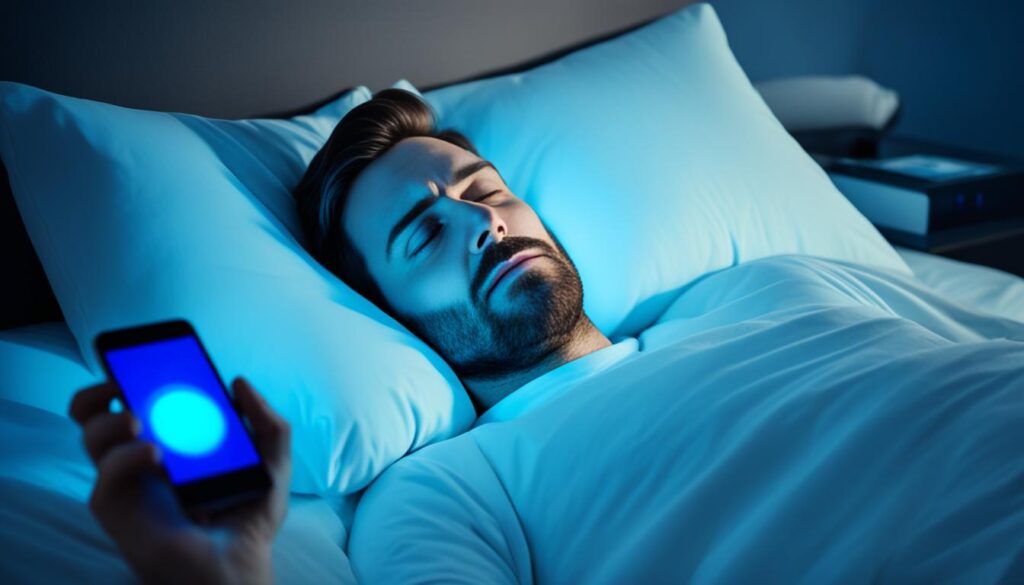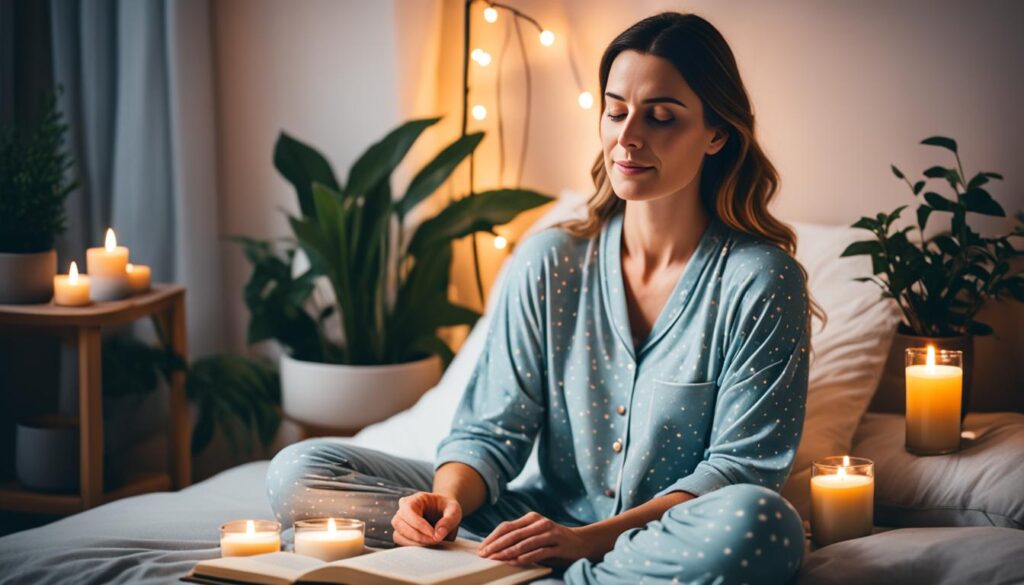Are you struggling to get a good night’s sleep, and wondering how it might be impacting your mental health? Creating a consistent sleep routine can be the key to unlocking better rest and improved overall well-being1. Chronic insomnia is connected to a higher risk of mental health issues, including depression and anxiety1. Disturbed sleep patterns are common in people with depression, often resulting in trouble falling asleep, frequent nighttime awakenings, and early morning awakenings1. Anxiety can also make it difficult to relax and fall asleep, leading to challenges in getting sound sleep1. Establishing a healthy sleep routine can be a game-changer for your mental wellness.
Key Takeaways
- Creating a consistent sleep routine is crucial for improving mental wellness.
- Chronic insomnia is linked to higher risks of mental health issues like depression and anxiety.
- Disturbed sleep patterns are common in people with depression and anxiety.
- The Stanford Sleep Health and Insomnia Program offers resources for those experiencing sleep difficulties.
- Establishing good sleep hygiene and effective sleep strategies can be assisted by Well-Being Coaches.
Importance of a Good Sleep Routine
Quality sleep is essential for both physical and mental well-being. Getting adequate, restorative sleep can provide a wealth of benefits, including boosting mood, improving cognitive function, and supporting the immune system2. Conversely, poor sleep habits can contribute to increased stress, anxiety, and depression, as well as impaired focus and productivity2. A consistent sleep routine helps regulate the body’s natural sleep-wake cycle, known as the circadian rhythm, which is crucial for overall health and well-being2.
Benefits of Quality Sleep
Sufficient sleep offers numerous advantages3. School-age children should get at least nine hours of sleep per night, while teens need between eight and 10 hours, and most adults require at least seven hours or more of sleep each night3. Incorporating a bedtime routine can provide a foundation for sufficient rest for those who do not get enough sleep regularly2. A bedtime routine involves performing a set of activities in the 30 to 60 minutes before going to bed every night, which can prime the body and mind for restful sleep2.
Consequences of Poor Sleep Habits
In contrast, consistently deficient sleep is linked to adverse health outcomes3. People with consistently deficient sleep are prone to weight gain and worsened ability to control blood sugar levels3. Short-term insomnia, where individuals struggle to sleep for a few weeks or months, and long-term insomnia, which persists for three months or longer, can significantly impact mental and physical health3. Insomnia rates have also increased during the pandemic, highlighting the importance of establishing healthy sleep habits3.
Establishing a consistent sleep routine is crucial for maintaining optimal mental wellness4. Crafting sustainable and beneficial routines makes healthy behaviors feel almost automatic4. Building an environment and set of routines that promote our goals can be beneficial for quality sleep4. Improving sleep hygiene has little cost and virtually no risk, making it an important part of a public health strategy4.
“An environment and habits optimized for better sleep can pave the way for higher-quality sleep and improved overall health.”4
Establish a Consistent Sleep Schedule
Maintaining a consistent sleep schedule, with a set bedtime and wake time, is the foundation of a good sleep routine5. Going to bed and waking up at the same time every day, even on weekends, helps train the body’s internal clock and promotes better sleep quality5. Sticking to a regular sleep schedule can also reduce the risk of sleep disorders and improve daytime functioning5.
The recommended amount of sleep for a healthy adult is at least seven hours, with most people not needing more than eight hours in bed to be well rested6. Consistent sleep schedules help in maintaining good sleep quality and the body’s internal clock, known as the circadian rhythm5.
Multiple factors can disrupt sleep routines, including jet lag, shift work, advanced or delayed sleep timing, artificial light exposure, fluctuating sleep hours, behavior patterns, caffeine and energy drinks consumption, and stress/emotional difficulties5. Establishing a consistent sleep schedule involves setting a bedtime and wake-up time, which should stay consistent from day-to-day and allow for at least seven hours of sleep each night5.
Sleep hygiene, including practices like exposure to natural light, reducing evening screen time, exercising, following a bedtime routine, being cautious with naps, and avoiding excessive alcohol and caffeine consumption, plays a vital role in an effective sleep routine5. Developing a consistent sleep-wake cycle can help regulate the body’s circadian rhythm and promote better mental and physical well-being5.
“Maintaining a consistent sleep schedule is the foundation of a healthy sleep routine, which can have a profound impact on our overall well-being.” – Sleep Expert, Dr. Sarah Johnson
Create a Relaxing Bedtime Routine
Developing a relaxing bedtime routine can be a game-changer for your sleep quality and overall mental wellness. By creating a consistent series of wind-down activities, you can signal to your body that it’s time to transition into a restful state, making it easier to fall asleep and stay asleep through the night.
Prepare Your Sleep Environment
The first step in establishing a relaxing bedtime routine is to optimize your sleep environment. Adjust the temperature, lighting, and noise levels in your bedroom to create a soothing, sleep-conducive atmosphere7. Well-rested individuals are more likely to have stronger, more positive relationships at home and work7.
Engage in Relaxing Activities
Incorporate a variety of calming activities into your bedtime routine to help you unwind and prepare for sleep. This can include reading a book, listening to soothing music or nature sounds, practicing light stretching or gentle yoga, or engaging in mindfulness meditation8. Ideal bedtime routine elements to plan for include reading, journaling, listening to soothing music or sounds, massage, meditation, progressive muscle relaxation, visualizations, stretches, non-activating yoga, rhythmic tapping or rocking, and soothing scents like lavender8.
Remember, the key is to find what works best for you and stick to a consistent routine8. Devoting 15-60 minutes before bedtime to a routine can be beneficial for sleep8. Establishing a sleep routine can contribute to long-term health benefits, lowering the risk of chronic health issues like diabetes, obesity, and heart disease7.
By creating a relaxing bedtime routine, you’ll be well on your way to better sleep and improved mental wellness7. A bedtime routine that includes relaxation techniques like reading, listening to calming music, or practicing gentle stretches can lead to a more peaceful transition to sleep7.
“Adults can benefit from a soothing bedtime routine, just like children.”8
| Recommended Bedtime Routine Elements | Benefits |
|---|---|
| Reading, journaling, listening to soothing music or sounds, massage, meditation, progressive muscle relaxation, visualizations, stretches, non-activating yoga, rhythmic tapping or rocking, and soothing scents like lavender. |
By incorporating a consistent bedtime and sticking to it, even on weekends, you can help regulate your body’s internal clock, making it easier to fall asleep and wake up naturally7. Bright light from screens such as TVs, computers, and smartphones can interfere with sleep patterns, so it’s best to avoid these activities before bed978.
Limit Screen Time Before Bed
The blue light emitted by electronic devices like smartphones, tablets, and computers can disrupt the body’s natural melatonin production, making it harder to fall asleep10. Prolonged screen time before bed has been associated with sleep problems such as difficulty falling asleep, waking up frequently during the night, and non-restorative sleep10. To promote better sleep and mental wellness, it’s crucial to limit screen time in the hours leading up to bedtime.
Studies have shown that reading on a device before bed can delay sleep by nearly an hour compared to reading a printed book11. Additionally, people using devices before bed had lower melatonin levels, took longer to fall asleep, and felt less alert the next morning11. Conversely, just 6-7 minutes of reading print material can reduce stress levels by 68%11.
Experts recommend turning off screens at least 30 minutes to an hour before bed to allow time for relaxation and winding down10. Some even suggest turning off screens at least two hours before bed for a full transition to sleep, particularly for those sensitive to the effects of screen time10. Keeping devices out of reach can also reduce nighttime phone use significantly11.
To create a more sleep-friendly environment, consider dimming the lights 1-2 hours before bedtime, as this can aid in better sleep by stimulating melatonin production11. Additionally, incorporating relaxing activities like listening to soothing music or nature sounds can help induce sleep11.
Ultimately, limiting screen time before bed and establishing a consistent, screen-free bedtime routine can significantly improve sleep quality and overall mental wellness11. By prioritizing healthy sleep habits, you can enhance your mental health and well-being.

“Better sleep hygiene through limiting screen time can significantly impact sleep quality and overall health.”
How to Create a Sleep Routine for Better Mental Wellness
Developing a consistent sleep routine is a crucial step in improving mental wellness. By establishing healthy sleep habits, such as maintaining a regular sleep schedule, creating a relaxing bedtime routine, and limiting screen time before bed, individuals can experience a range of benefits, including reduced stress and anxiety, improved cognitive function, and enhanced overall well-being12.
One of the primary advantages of a consistent sleep routine is that it can help reinforce the body’s natural sleep cycle and reduce daytime sleepiness12. Going to bed at a consistent time to ensure 7-8 hours of sleep each night can also improve sleep quality12.
- Engage in regular exercise, even as little as 30 minutes per day, to enhance sleep quality12.
- Limit caffeine intake, especially in the afternoon, as it can benefit sleep12.
- Maintain an ideal bedroom temperature between 60-67°F (15.6-19.4°C) for optimal sleeping conditions12.
- Use the bed exclusively for sleep and sex to strengthen the brain’s association between bed and sleep12.
- Avoid napping late in the afternoon to prevent disruptions in nighttime sleep12.
- Engage in stress-reducing activities before bedtime, such as meditating or using a weighted blanket, to aid in falling asleep12.
- Manage light exposure, including limiting blue light from devices and using warm-light spectrum lightbulbs at night, to support better sleep12.
Establishing a sleep routine can have a profound impact on mental health. About one in five people will suffer from a diagnosable mental disorder in a year, and many ignore emotional messages indicating a problem, hoping it will resolve on its own13. However, social interaction with someone who cares about you and regular physical activity can improve mental and emotional well-being13.
| Routine Element | Benefit |
|---|---|
| Consistent Morning Routine | Lower chances of showing symptoms of hyperactivity and impulsiveness in children14. |
| Consistent Mealtimes, Bedtime, and Homework Times | Lower chances of showing symptoms of hyperactivity and impulsiveness in children14. |
| Consistent Routines for Recovering from Addiction | Can help stave off boredom and potential relapse14. |
| Consistent Routines for Bipolar Disorder | May help stabilize mood episodes14. |
| Consistent Sleep-Wake Cycle | Disruptions can trigger depression, mood disorders, and other mental health problems14. |
Creating and sticking to a sleep routine may take time, as it can take an average of 66 days to establish new habits14. However, using fitness trackers and technology can assist in setting healthy habits and routines, and rewarding oneself for sticking to routines can help reinforce new behaviors14.
By prioritizing a consistent sleep routine, individuals can take a significant step towards improving their mental wellness and overall well-being. Remember, small, incremental changes can lead to lasting positive impacts on your health and happiness.
Practice Relaxation Techniques
Incorporating relaxation techniques into your bedtime routine can be a powerful tool for promoting better sleep and overall mental wellness. By engaging in practices that calm the mind and body, you can effectively reduce stress and anxiety, which are common culprits behind sleep disturbances.
Deep Breathing Exercises
Deep breathing exercises, which involve slow, controlled inhalations and exhalations, have been shown to be particularly effective for relaxation15. Gentle breathing and progressive muscle relaxation practiced for 20 to 25 minutes daily for two weeks can aid in stress reduction15. Additionally16, deep breathing exercises and muscle relaxation techniques can help in calming the mind and body16.
Mindfulness Meditation
Mindfulness meditation, which focuses on being present in the moment and accepting thoughts and emotions without judgment, can also be a valuable tool for improving sleep quality and mental wellness15. Activities like yoga, tai chi, and meditation have been shown to improve sleep by reducing cortisol and adrenaline release1516. Relaxation techniques can help slow heart rate, lower blood pressure, and improve digestion, as well as reduce stress hormones, ease muscle tension, and improve sleep quality16.
17 Engaging in relaxation exercises can help invoke the body’s natural relaxation response to promote better sleep17. Diaphragmatic breathing has been shown to reduce stress, increase relaxation, strengthen the diaphragm, and improve breathing efficiency17. Body scans, a type of meditation focusing on different body parts, can aid in reducing stress and promoting sleep17.
17 Yoga nidra, a form of meditative yoga, is designed to induce calmness and improve sleep quality17. Progressive muscle relaxation, which involves tensing and relaxing different muscle groups, can help release tension and promote relaxation17.
17 Non-sleep deep rest (NSDR) aims to calm the conscious mind without inducing sleep, potentially enhancing energy restoration and brain function17. Regular practice and ongoing use of relaxation exercises are generally more effective than short-term attempts17.
By incorporating a variety of relaxation techniques into your sleep routine, you can cultivate a sense of calm and tranquility, setting the stage for a restful and rejuvenating night’s sleep. Remember, consistency is key, so make relaxation a regular part of your daily routine for the most significant and long-lasting benefits.
Avoid Stimulants and Heavy Meals
Achieving a good night’s sleep is essential for our mental well-being, but certain habits can disrupt this crucial restorative process. One key factor to consider is the impact of stimulants and heavy meals before bedtime18.
Consuming caffeinated beverages, nicotine, or other stimulants in the hours leading up to sleep can significantly impair your ability to fall and stay asleep. Experts recommend avoiding these substances at least 8 hours prior to your desired bedtime19. Similarly, indulging in heavy, large meals right before bed can tax your digestive system, leading to disruptive sleep patterns18. To promote better sleep hygiene, it’s best to opt for lighter, more easily digestible snacks a few hours before bedtime20.
By making conscious choices to avoid stimulants and heavy meals in the hours leading up to sleep, you can create a more relaxing and restorative sleep environment. This, in turn, can have a positive impact on your overall mental wellness and help you wake up feeling refreshed and rejuvenated20.
“Avoiding stimulants and large meals close to bedtime is crucial for maintaining a healthy sleep routine and promoting better mental well-being.”
Incorporate Light Exercise
Engaging in light physical activity, such as gentle stretching or a brief walk, in the hours before bedtime can help promote better sleep quality21. Exercise can help reduce stress, improve mood, and prepare the body for restful sleep, without overstimulating the mind and body close to bedtime21. The decline in core body temperature after exercising typically occurs 30 to 90 minutes post-activity, facilitating sleepiness21.
Regular exercise helps regulate the body’s internal clock, the circadian rhythm, resulting in more consistent sleep patterns22. Exercise can also reduce symptoms of insomnia and sleep apnea, as well as decrease stress and anxiety22. Incorporating light exercise into your evening routine can have a positive impact on your overall sleep quality and mental wellness.
While the timing of exercise can vary among individuals, with some benefiting regardless of the time of day, it’s generally advised to engage in aerobic exercise 1 to 2 hours before bedtime for individuals sensitive to the endorphin release that may keep them awake21. Moderate aerobic exercise for at least 30 minutes can lead to improved sleep quality on the same night of the activity, and it increases the amount of slow wave sleep, which is beneficial for deep sleep and rejuvenation21.
| Exercise Timing | Benefits |
|---|---|
| Morning | Often experience deeper, more restorative sleep, with a more consistent sleep schedule22. |
| Afternoon | Can help alleviate daily stresses, potentially leading to a relaxed evening22. |
| Evening | Can de-stress after a long day, particularly calming activities like yoga or tai chi22. |
Regardless of the timing, regular physical activity generally leads to better sleep quality and longer sleep duration22. Prioritizing sleep over a single workout session can have more significant long-term health benefits22.

By incorporating light exercise into your evening routine, you can unlock the benefits of improved sleep quality and better mental wellness212223.
Keep a Sleep Journal
Keeping a sleep journal can be a valuable tool in developing and maintaining a consistent sleep routine. By tracking factors such as bedtime, wake time, sleep duration, and sleep quality, individuals can identify patterns and potential areas for improvement in their sleep habits24. This information can then be used to make targeted changes to their sleep routine and optimize their sleep hygiene.
Sleep journaling is recommended to track sleep habits, highlighting the importance of monitoring bedtime and wake-up times24. Exposure to light during the day is suggested for better sleep patterns, emphasizing the impact of light on circadian rhythms24. The benefits of bullet journaling include improved organization and stress reduction as a way to enhance mental wellness24. Breathing exercises are mentioned to help clear the mind and reduce restlessness before sleep, indicating a method for relaxation24.
Doctors usually advise people to keep a sleep diary for at least one week25. Actigraphy, which monitors movement during sleep, offers more objective data than a sleep diary25. Results from sleep logs and actigraphy are often similar, and doctors may request the use of both sleep diaries and actigraphy simultaneously for a comprehensive assessment25.
| Sleep Tracking Method | Advantages | Disadvantages |
|---|---|---|
| Sleep Diary |
|
|
| Actigraphy |
|
|
| Polysomnography |
|
|
Questionnaires for sleep evaluation are typically less precise compared to sleep diaries25. Polysomnography is the gold standard for diagnosing many sleep disorders but may be expensive and requires spending a night in a sleep clinic25. Sleep diaries are important due to their simplicity, low cost, and ability to provide broad insights into sleeping habits25.
Creating a dark sleeping environment is encouraged to improve sleep quality, suggesting the elimination of light sources24. Temperature regulation in the bedroom is discussed, emphasizing the importance of setting an ideal temperature for restful sleep24. Establishing a consistent bedtime and wake-up time is advised to manage sleep routines effectively24.
“Consistency is key when it comes to developing a healthy sleep routine. By tracking your sleep patterns, you can identify areas for improvement and make targeted changes to optimize your sleep quality.”
The effects of reducing caffeinated or alcoholic beverages on sleep quality are highlighted for consideration24. Limiting screen time before bed is recommended to improve sleep hygiene and minimize disruptions to the sleep cycle24. Incorporating physical activity into the daily routine is suggested as a way to promote better sleep and overall wellness24.
Eating dinner at least 3 to 4 hours before bedtime is recommended for optimal digestion and sleep quality24. Creating a designated workspace outside of the bed is encouraged to enhance productivity and separate work from relaxation24. Limiting afternoon naps to 10 to 20 minutes is advised to avoid disrupting the sleep cycle and promote feeling refreshed2426.
Recommended sleep duration for a healthy adult: between seven and nine hours per night. 41.5% of adults in the UK are affected by snoring26. In cases of regular night terrors, therapy may be needed to address underlying trauma26. Cognitive Behavioral Therapy (CBT) is used to treat insomnia and some mental health issues26. Sleep apnea causes shallow breathing or pauses in breathing lasting up to 30 seconds, and devices like CPAP can aid in treating it26. Sleepwalking is more common in children than adults, and environmental factors like light, noise, and temperature can impact sleep quality26.
Manage Stress and Worries
Addressing stress and worries before bed is a crucial aspect of cultivating a successful sleep routine. Engaging in activities like journaling, where individuals can write down their thoughts and concerns, can help clear the mind and prepare for restful sleep27. Additionally, practicing gratitude by reflecting on positive events or aspects of one’s life can promote a sense of calm and well-being, further supporting a good night’s sleep28.
Journaling Before Bed
Journaling can be a powerful tool for managing stress and worries before bed27. A 2018 study suggested that regular journaling might be linked to a higher quality of life and proactive self-care behaviors for individuals managing chronic health conditions, including mental health conditions like depression27. By writing down thoughts, feelings, and concerns, individuals can find clarity, release emotional tension, and prepare for a more restful sleep29.
Practicing Gratitude
Incorporating gratitude practices into one’s nighttime routine can also contribute to better sleep and overall mental wellness28. When individuals take time to reflect on the positive aspects of their lives, it can promote a sense of calm and well-being, helping to alleviate stress and worries before bed28. This practice can be as simple as jotting down a few things one is grateful for or mentally reviewing the day’s blessings before drifting off to sleep.
By actively managing stress and worries through journaling and practicing gratitude, individuals can create a more conducive environment for restful sleep, ultimately supporting their mental wellness292827.

“Journaling and gratitude practices can be powerful tools in managing stress and worries, paving the way for a more restorative night’s sleep.” – Sleep and Mental Health Expert
Create a Calming Environment
Creating a tranquil and comfortable sleep environment is crucial for achieving quality sleep and promoting mental wellness. By incorporating calming elements like aromatherapy, soothing sounds, and a relaxing ambiance, you can signal your body and mind that it’s time to wind down and prepare for restful sleep.
Aromatherapy for Sleep
Aromatherapy can be a powerful tool for inducing relaxation and enhancing sleep. Certain essential oils, such as lavender, chamomile, and ylang-ylang, have been shown to have a calming effect on the mind and body30. You can introduce these scents into your bedroom through the use of essential oil diffusers, candles, or even a few drops of oil on your pillow.
Soothing Sounds for Sleep
Ambient noise or soothing sounds can help mask disruptive noises and create a sense of tranquility in your sleep environment. Consider playing soft, instrumental music, nature sounds (like rainfall or gentle waves), or even white noise to help you drift off to sleep more easily31. Some people find that using a sound machine or downloading sleep-inducing audio tracks can be especially beneficial for promoting a calming sleep routine.
In addition to aromatherapy and soothing sounds, ensuring your bedroom is cool, dark, and free from clutter can also contribute to a more calming sleep environment2. By creating a space that is conducive to relaxation, you’ll be better equipped to wind down and enjoy a more restful night’s sleep, which can have a positive impact on your overall mental well-being30312.
Develop a Nighttime Ritual
Establishing a consistent nighttime ritual, or series of activities performed in the same order each evening, can help reinforce the body’s sleep-wake cycle and make it easier to fall asleep2. This ritual may include a combination of relaxing activities, preparing the sleep environment, and managing stress, to create a personalized and effective bedtime routine2.
Start by setting a consistent bedtime and wake-up time that work with your schedule2. Aim to begin your nighttime routine 30 minutes to 2 hours before your desired bedtime, allowing your body and mind to gradually wind down2. Avoid using electronic devices like smartphones, tablets, and computers in the evening, as the blue light they emit can suppress melatonin production and trick the brain into thinking it’s daytime2.
Instead, engage in calming activities that can help promote relaxation and better sleep quality32. This may include taking a warm bath, reading a book, or listening to soothing music32. Avoid heavy meals and alcohol close to bedtime, as they can disrupt your sleep2.
Incorporate relaxation techniques, such as deep breathing exercises, progressive muscle relaxation, or meditation, to help release physical and mental tension before bed2. Writing a to-do list or journaling can also be helpful for clearing your mind and preparing for a restful night’s sleep2.
Finally, create a sleep-friendly environment in your bedroom by keeping it cool, dark, and quiet2. Consider using an aromatherapy diffuser with calming scents, such as lavender, to further enhance the relaxation process2.
By developing a consistent nighttime ritual, you can reinforce your body’s natural sleep-wake cycle and improve the quality of your sleep, ultimately enhancing your overall mental wellness32. Remember, the key is to find a routine that works best for you and to stick to it consistently2.
“A consistent bedtime routine can be a powerful tool in promoting better sleep and overall well-being.” – Sleep Expert, Dr. Sarah Johnson
Seek Professional Help if Needed
While a consistent sleep routine can significantly improve sleep quality and mental well-being, some individuals may continue to struggle with persistent sleep issues or sleep disorders33. In such cases, it is advisable to seek the guidance of a healthcare professional, such as a sleep specialist or mental health provider34.
A sleep specialist or mental health professional can help identify and address any underlying medical or psychological factors that may be contributing to the sleep difficulties. They can provide personalized recommendations and treatments to improve sleep quality and overall mental wellness33. This may include therapies like cognitive-behavioral therapy (CBT) or the prescription of appropriate medications, if necessary35.
Seeking professional help is particularly important for individuals experiencing significant sleep disturbances that are impacting their daily lives, or for those dealing with co-occurring mental health conditions like anxiety or depression34. A healthcare provider can work with the individual to develop a comprehensive plan to address the root causes of the sleep issues and provide effective strategies for managing them33.
By addressing sleep problems with the guidance of a professional, individuals can not only improve their sleep quality but also their overall mental health and well-being35. With the right support and treatment, many people are able to overcome persistent sleep issues and achieve better mental and physical health.
Remember, seeking professional help is a sign of strength and a commitment to your own well-being. Don’t hesitate to reach out and take the first step towards better sleep and improved mental health333435.
Conclusion
Developing a consistent sleep routine is a crucial step in promoting better mental wellness. By establishing healthy sleep hygiene habits, such as maintaining a regular sleep schedule, creating a relaxing bedtime routine, and incorporating relaxation techniques, individuals can experience a range of benefits, including reduced stress and anxiety, improved cognitive function, and enhanced overall well-being36.
Research has shown a clear correlation between sleep disturbances and various mental health conditions, including depression, anxiety, and schizophrenia36. Furthermore, studies have highlighted the bidirectional relationship between sleep issues and mental disorders, with insomnia being a predictor of depression and sleep dysfunction linked to the occurrence of delusions and hallucinations36.
By prioritizing consistent sleep habits and making it a central part of their self-care routine, individuals can improve their mental health and positively impact various aspects of their lives. Through the adoption of evidence-based practices, such as cognitive-behavioral therapy for insomnia and non-pharmacological sleep interventions, people can foster better sleep and, in turn, enhance their overall well-being36.
FAQ
What are the benefits of creating a consistent sleep routine?
Creating a consistent sleep routine can improve mental wellness by promoting better sleep quality, reducing stress, and boosting overall well-being. A regular bedtime routine helps signal to the body that it’s time to wind down and prepare for restful sleep. Establishing healthy sleep habits is crucial for managing depression, anxiety, and other mental health concerns.
How does quality sleep impact physical and mental health?
Quality sleep is essential for physical and mental health. Getting adequate, restorative sleep can boost mood, improve cognitive function, and support the immune system. Conversely, poor sleep habits can contribute to increased stress, anxiety, and depression, as well as impaired focus and productivity.
What are the key components of a consistent sleep schedule?
Maintaining a consistent sleep schedule, with a set bedtime and wake time, is the foundation of a good sleep routine. Going to bed and waking up at the same time every day, even on weekends, helps train the body’s internal clock and promotes better sleep quality.
How can a relaxing bedtime routine improve sleep quality?
Developing a relaxing bedtime routine can signal to the body that it’s time to wind down and prepare for sleep. This can include creating a comfortable, sleep-conducive environment and engaging in calming activities, such as reading, light stretching, or practicing meditation or deep breathing exercises.
How does screen time before bed affect sleep quality?
The blue light emitted by electronic devices, such as smartphones, tablets, and computers, can disrupt the body’s natural melatonin production and make it more difficult to fall asleep. Avoiding the use of these devices in the hours leading up to bedtime can help improve sleep quality and promote better mental wellness.
What relaxation techniques can be incorporated into a bedtime routine?
Incorporating relaxation techniques into your bedtime routine, such as deep breathing exercises and mindfulness meditation, can help calm the mind and body, preparing you for restful sleep.
What habits should be avoided before bedtime?
Consuming stimulants, such as caffeine or nicotine, and heavy, large meals in the hours leading up to bedtime can disrupt sleep and make it more difficult to fall and stay asleep. Avoiding these substances and opting for lighter, more easily digestible snacks can help create a more relaxing and restorative sleep environment.
How can light physical activity before bed impact sleep quality?
Engaging in light physical activity, such as gentle stretching or a brief walk, in the hours before bedtime can help promote better sleep quality. Exercise can help reduce stress, improve mood, and prepare the body for restful sleep, without overstimulating the mind and body close to bedtime.
How can a sleep journal help improve sleep habits?
Keeping a sleep journal can be a valuable tool in developing and maintaining a consistent sleep routine. By tracking factors such as bedtime, wake time, sleep duration, and sleep quality, individuals can identify patterns and potential areas for improvement in their sleep habits.
How can addressing stress and worries before bed improve sleep quality?
Addressing stress and worries before bed, such as through journaling or practicing gratitude, can help clear the mind and prepare for restful sleep.
What elements can create a calming sleep environment?
Creating a calming and comfortable sleep environment, such as incorporating relaxing elements like aromatherapy, soothing music or nature sounds, can significantly impact the quality of one’s sleep.
How can developing a consistent nighttime ritual improve sleep?
Establishing a consistent nighttime ritual, or series of activities performed in the same order each evening, can help reinforce the body’s sleep-wake cycle and make it easier to fall asleep.
When should individuals seek professional help for sleep issues?
If individuals continue to struggle with persistent sleep issues or poor sleep quality despite implementing a consistent sleep routine, it may be beneficial to seek the guidance of a healthcare professional, such as a sleep specialist or mental health provider.
Source Links
- Sleep Corner: Mental Health and Sleep – How They’re Connected
- Bedtime Routines for Adults
- Good Sleep for Good Health
- Mastering Sleep Hygiene: Your Path to Quality Sleep
- How to Fix Your Sleep Schedule
- 6 steps to better sleep
- How to create the ideal bedtime routine for adults — Calm Blog
- Create a Simple Bedtime Routine to Sleep Better
- How to Sleep Better with a Bedtime Routine
- 4 Tips To Reduce Screen Time Before Bed | Opal
- 8 Ways Reducing Screen Time Can Lead to Better Sleep
- 12 Tips for Better Sleep Hygiene
- Building Better Mental Health – HelpGuide.org
- Psychological Benefits of Routines
- Sleepless Nights? Try Stress Relief Techniques
- Relaxation techniques: Try these steps to lower stress
- Relaxation Exercises To Help Fall Asleep
- An hour-by-hour guide to your bedtime routine
- 4 Tips for Building Better Sleep Habits | Merritt Clubs
- Fall asleep faster and sleep better – Every Mind Matters
- Exercising for Better Sleep
- Exercise for sleep: 8 best exercises to improve your sleep — Calm Blog
- The Connection Between Diet, Exercise, and Sleep
- Build a Better Sleep Routine
- Sleep Diary
- How to sleep better
- 16 Simple Ways to Relieve Stress and Anxiety
- Sleep Better with Less Stress
- Mental Health and Sleep
- Establishing a Bedtime Routine for Better Sleep
- How To Sleep Better: 15 Science-Backed Tips
- Build a Bedtime Routine | Kelty Mental Health
- 10 Best Tips To Improve Mental Health
- Prioritizing and Taking Care of Your Mental Health
- Understanding Sleep and Mental Health | Ellie Mental Health, PLLP
- Improving sleep quality leads to better mental health: A meta-analysis of randomised controlled trials


